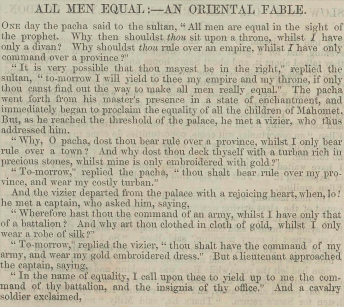All Men Equal:—An Oriental Fable
by Anonymous
The True Briton, vol. 1, issue 9 (1852)
Pages 130-131

Introductory Note: “All Men Equal:—An Oriental Fable” was included in The True Briton as a morality tale relating to the journal’s stated mandate to safeguard society. The story’s pointed moral could be seen as a thinly veiled commentary on the class system of Victorian England or as a fable asserting Christianity’s dominance over foreign belief structures.
Advisory: This story depicts racist ideals.
ONE day the pacha said to the sultan, “All men are equal in the sight of the prophet. Why then shouldst thou sit upon a throne, whilst I have only a divan? Why shouldst thou rule over an empire, whilst I have only command over a province?”
“It is very possible that thou mayest be in the right,” replied the sultan, “to-morrow I will yield to thee my empire and my throne, if only thou canst find out the way to make all men really equal.” The pacha went forth from his master’s presence in a state of enchantment, and immediately began to proclaim the equality of all the children of Mahomet. But, as he reached the threshold of the palace, he met a vizier, who thus addressed him.
“Why, O pacha, dost thou bear rule over a province, whilst I only bear rule over a town? And why dost thou deck thyself with a turban rich in precious stones, whilst mine is only embroidered with gold?”
“To-morrow,” replied the pacha, “thou shalt bear rule over my province, and wear my costly turban.”
And the vizier departed from the palace with a rejoicing heart, when, lo! he met a captain, who asked him, saying,
“Wherefore hast thou the command of an army, whilst I have only that of a battalion? And why art thou clothed in cloth of gold, whilst I only wear a robe of silk?”
“To-morrow,” replied the vizier, “thou shalt have the command of my army, and wear my gold embroidered dress.” But a lieutenant approached the captain, saying,
“In the name of equality, I call upon thee to yield up to me the command of thy battalion, and the insignia of thy office.” And a cavalry soldier exclaimed,
“In the name of equality, oh lieutenant, I demand from thee thy rank and thy pay.”
And a foot-soldier spoke to the cavalry soldier, saying,
“Give me thy horse and thy sabre, and do thou take my gun, for it is too heavy for me to carry, and are we not all equal? Wherefore should I bear the load?” And each one when thus addressed, replied,
“To-morrow thou shalt have all thou requirest,” for each one had desired to place himself on a level with his superior, forgetting that he also had an inferior beneath him. But as all had a superior, and none were satisfied to remain subaltern, they were for ever struggling to rise in the name of equality.
So that at last a fearful civil war broke out, and none of the parties being able to come to an agreement between themselves, they killed one another from one end of the kingdom to the other, the conquerors disputing together over the spoil of the vanquished, and inequality re-appearing and prevailing as before, after each new displacement of the standing order of things.
Those who survived after this terrible struggle were even more embittered and more miserable than before, when, lo! one day a poor slave, who had remained contentedly in his own position, without envying that of others, thus addressed the dethroned sultan, the despoiled pachas, the viziers who had been deprived of their commands, the captains who had lost their battalions, the dismounted horsemen and the unarmed soldiers, saying, “Each one of you thought himself more fortunate than I, and yet I am now the happiest of you all. And know you wherefore I am happy? Even because there is a Prophet yet greater than your prophet, and He has taught His followers this truth, ‘the lofty cedar protects the head of the lowly hyssop, and the lowly hyssop nourishes the roots of the lofty cedar.’ They therefore stand equally in need the one of the other, and therein consists their true equality. The poor shall never cease out of the land, for man was not meant to find his full happiness here below.1Deuteronomy 15:11. Blessed are they who weep now, for they shall be comforted.2Matthew 5:4. Woe unto men who despoil others instead of bestowing upon them of their abundance, for it is easier for a camel to pass through the eye of a needle than for a wicked rich man to enter into the kingdom of Heaven.3Matthew 19:24. And this Prophet who has taught us these things is my God,” continued the slave, bowing his head in reverence before that sacred name, “and therefore it is that I am a happy man!”
Word Count: 788
Audiobook Format
Original Document

Topics
How To Cite (MLA Format)
“All Men Equal:—An Oriental Fable.” The True Briton, vol. 1, no. 9, 1852, pp. 130-1. Edited by Ryan Brown. Victorian Short Fiction Project, 15 February 2026, https://vsfp.byu.edu/index.php/title/all-men-equal-an-oriental-fable/.
Editors
Ryan Brown
Isaac Robertson
Cosenza Hendrickson
Danny Daw
Alexandra Malouf
Posted
20 September 2018
Last modified
14 February 2026



